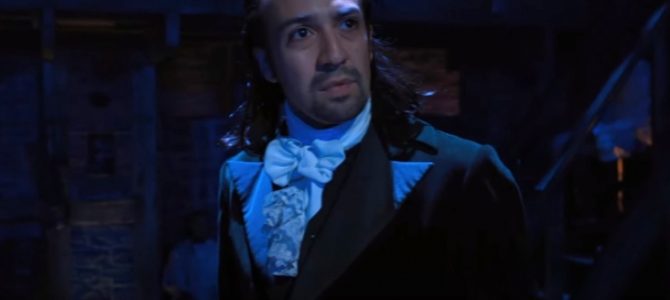
“Hamilton” is coming to Disney Plus on July 3, and the preview looks spectacular.
July 3 on @disneyplus, #Hamilfilm.
May you always be satisfied… pic.twitter.com/42ecf0XkHO
— Lin-Manuel Miranda (@Lin_Manuel) June 22, 2020
As monuments and memorials of our shared American history are currently under an all-out assault, the show also looks like a time capsule from a simpler era. I don’t mean 1776. I mean when “Hamilton” debuted on Broadway in 2015. Way back then, Lin Manuel Miranda had the imagination to cast George Washington as a black man and write hip-hop lyrics about the general’s “ragtag volunteer army in need of a shower” who “somehow defeat a global superpower.”
It was a story about the American founding, told in the language and music of today’s America, performed by a cast that looks like today’s America. And we loved it. “Hamilton” won not just the accolades of media and cultural elites but also the undying affection of average Americans, millions of whom have ponied up the steep ticket price to see the live show.
Just five years later, the love for America’s founding that “Hamilton” exudes has been utterly abandoned by elites. The New York Times is currently leading the charge to recast America’s true founding and animating spirit not as the liberty of 1776, but as the slavery of 1619. This, they’re now teaching our school children, is a truer characterization of who we are.
As for George Washington, whom “Hamilton” deemed “the venerated Virginian veteran,” we the people are now tearing down his statue in the streets. Never mind his many years of military service and leadership, the hard-fought battles against impossible odds to give us our independence, the forging of a new government and the precedent of stepping down after two terms as president — all of which “Hamilton” highlights about Washington’s legacy.
No, the history-haters tell us, none of this matters. The shortcomings and sins of America’s first president are the overriding facts about him — the only facts worth knowing. Washington must go.
It’s healthy for Americans to grapple with our history, to be honest about it, and — most importantly — to continually do better in living by the principles we corporately declared on July 4, 1776. But the current national divide can be summed up in a very simple binary: it’s a contest between those who reject the American founding as embodied in that Declaration and those who still believe in it.
For those of us who fall in the latter category, “Hamilton” is on our side. Here’s what the musical gets right that the history-haters get wrong.
1. America Is About Universal Ideas, Not Blood and Soil
Miranda was famously inspired to write his improbable musical when he read Ron Chernow’s 2004 biography of Alexander Hamilton. The story of Washington’s right-hand man stood out to Miranda because, unlike so many of the other Founding Fathers, Hamilton didn’t emerge from the landed aristocracy. In its opening sentence, the musical marvels:
“How does a bastard, orphan, son of a whore
And a Scotsman, dropped in the middle of a forgotten spot
In the Caribbean by providence impoverished
In squalor, grow up to be a hero and a scholar?”
The rest of the musical answers that question, highlighting Hamilton’s outsider status as a fatherless immigrant who used the power of the written word to forge a place for himself as well as the new nation. In a 2016 interview with Rolling Stone, Miranda says Hamilton reminded him of hip-hop artists like Jay Z, Eminem, Biggie, and Lil Wayne, who also “wrote their way out” of the world into which they had been born.
Although Hamilton was able to build a successful life for himself in New York, the musical shows that his lack of pedigree continued to haunt him, with political foes labeling him a “Creole bastard.” The musical also identifies up-from-the-bottom Hamilton not as America’s victim, but as its true embodiment. “Just like my country, I’m young, scrappy, and hungry,” Hamilton sings in the iconic song “My Shot.” Near the end of the show, Hamilton leaves these parting words for the republic:
“America, you great unfinished symphony, you sent for me.
You let me make a difference:
A place where even orphan immigrants
Can leave their fingerprints and rise up.”
Through his extensive research and the collaboration of historians like Chernow, Miranda hits on a fundamental truth: unlike most nations in the world, American identity is not tied to lineage, origins, or borders. It’s tied to ideas: the ideas that Hamilton, Jefferson, Madison, and others articulated in their copious writings. It’s no accident that we mark our founding not from the anniversary of a colonial settlement, treaty, or military victory, but from the moment we put words on paper, declaring that “all men are created equal, and are endowed by their Creator with certain unalienable rights.”
This is why it’s a beautiful thing to see so many people of color portraying the Founders in the cast of “Hamilton.” American history isn’t an ethnic heritage. It belongs to all of us. The ideals of liberty — though realized far too slowly for far too many of us — are timelessly true and universally human.
Leslie Odom, Jr., who originated the role of Aaron Burr, described the importance of “Hamilton”’s diverse artistry best: “It is quite literally taking the history that someone has tried to exclude us from and reclaiming it. We are saying we have the right to tell it too.” Yes. You do, and you should. It is yours. And when it’s destroyed, the loss is yours too.
2. U.S. History Should Be Told With Honesty and Perspective
One of the things “Hamilton” does well is packing a vast amount of authentic, detailed history into two-and-a-half hours of rollicking, tear-jerking fun — all while making it rhyme! Miranda’s research comes through in nearly every song: from George Washington’s struggle to obtain basic supplies for his army; to the importance of the Federalist Papers in securing ratification of the Constitution; to the compromise that established Washington, D.C. as the nation’s capital.
Along the way, the musical also highlights how early America had yet to progress. “We hold these truths to be self-evident, that all men are created equal,” the Schuyler sisters sing. “And when I meet Thomas Jefferson, I’m ‘a compel him to include women in the sequel.”
The paradox of slavery is also highlighted throughout the musical. Yet the ultimate overthrow of slavery is foreshadowed not as a contradiction to the American founding but as its fulfillment. The fact that Hamilton was an abolitionist gets several mentions, including the fact that his widow spoke against slavery in her effort to continue his work. The show also highlights the historical truth that “black and white soldiers” both fought for American independence. Hamilton friend John Laurens raps:
“But we’ll never be truly free
Until those in bondage have the same rights as you and me
You and I. Do or die. Wait till I sally in
On a stallion with the first black battalion.”
While refusing to lionize the Founders and gloss over their hypocrisies, “Hamilton” also refuses to commit the opposite error of demonizing them, reducing them to nothing more than their faults. The Founders are humanized, seen in all their messy complexity, while acknowledging the significance of what they created: a new nation conceived in liberty, unlike anything else that existed at the time. “Hamilton” displays the groundbreaking nature of what the Founders achieved when George Washington steps down from the presidency, and King George III expresses his bewilderment: “Are they going to keep on replacing whoever’s in charge?”
Seeing the Founding Fathers as fully human, and understanding the historical context in which they lived, liberates us from the burden of requiring that they be perfect. Instead, it allows us to acknowledge and appreciate what they built: a nation that vastly moved the needle toward human freedom and flourishing.
“I think the notion of our Founders being these perfect men who got these stone tablets from the sky that became our Constitution and Bill of Rights is bullsh-t,” Miranda told Rolling Stone. “They did a remarkable thing in sticking the landing from revolution to government. That’s the hardest thing to do.”
3. Grace and Empathy are Virtues
In its treatment of the Founding Fathers as they truly were, “Hamilton” stands out in its humor, grace, and empathy. It’s clear throughout the story that Miranda made a real effort to get inside the head of his characters and view them with understanding.
Even arch-nemesis Aaron Burr, the “d-mn fool” who shot and killed Hamilton in a duel, is painted as a full and complex character rather than a cartoon villain. One of the most poignant moments in the show comes moments after Burr fires the fatal shot, as he sings:
“History obliterates
In every picture it paints,
It paints me and all my mistakes.
When Alexander aimed at the sky
He may have been the first one to die,
But I’m the one who paid for it.
I survived, but I paid for it.
Now I’m the villain in your history.
I was too young and blind to see…
I should’ve known
I should’ve known the world was wide enough for both Hamilton and me.”
We would be wise to learn the corresponding lesson here: the world is wide enough for both America’s past and America’s present. We don’t have to pit them against each other in a duel to the death.
It wasn’t long ago that Americans across the political spectrum understood this. The day after rioters toppled the George Washington statue in Portland, I shed tears as I re-watched the lovely clip of a “Hamilton” performance given at the White House for President Barack Obama four short years ago. Obama was then in the final months of his administration, and the song “One Last Time,” about George Washington’s farewell address, was especially bittersweet for those in the audience.
Pay close attention to the lyrics lifted directly from Washington’s real address, in which he admits to the probability of “many errors” and expresses the hopes that his country will “view them with indulgence,” in light of the “forty-five years of my life dedicated to its service with an upright zeal.” This is a direct appeal to modern-day Americans from our first president, which needs to be heard.
But listen also to what our 44th president — and the first black man elected to occupy Washington’s office — had to say here. “What an incredible gift these folks have given to the United States of America,” he said, referring to the cast of “Hamilton.” “It is rare where a piece of art can remind us about what’s best in ourselves. And that’s what these guys have done. And that is a great gift.”
President Obama was right about “Hamilton,” and “Hamilton” was right about America. It’s the history-haters who are wrong.









